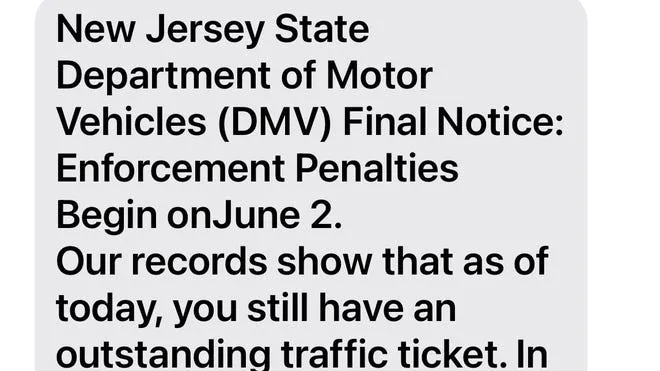Introduction
In recent weeks, authorities in Maryland have soundly addressed a new wave of fraudulent text message scams targeting drivers, warning citizens about text messages impersonating the Department of Motor Vehicles (DMV). These scams can lead to financial theft and identity fraud, thereby putting the public on high alert. Here’s what you need to know to protect yourself.
The Mechanics of the Scam
The scam typically starts with an unsolicited text message sent to drivers claiming to be from the Maryland DMV. The messages often include false information about overdue registration fees or unpaid traffic fines. In these messages, scammers demand immediate payment via links or suggest that recipients call a specific number to resolve the alleged issue.
For example, one version of the scam message states: ‘Your vehicle registration is suspended due to an unpaid fine. Please resolve this immediately to avoid penalties. Visit [Link] to pay now.’ In reality, such messages are not from the DMV and the link may lead to a phishing site designed to gather personal information or install malware on the recipients’ devices.
Why the Scam Is Effective
This kind of scam is known as phishing, where fraudsters try to trick victims into revealing sensitive information, such as credit card numbers or Social Security numbers. The urgency embedded in messages regarding vehicle registration resonates with many drivers, as they may fear facing legal consequences or fines. Consequently, many might feel pressured to act quickly without validating the sender’s legitimacy.
Recent Incidents and Police Warnings
<pSince the beginning of 2023, various police departments across Maryland have reported a significant increase in such scams. This prompted the Maryland State Police to release a public warning urging residents to stay vigilant. They advised citizens to be skeptical if they receive unexpected messages demanding payment related to their vehicle registration or fines.
Authorities noted that traditional methods of communication, like mail, are still the official channels used by the DMV for notifications regarding fees or fines. The DMV does not solicit personal information through text messages or email, and individuals should always reach out directly to the DMV if unsure about any notifications received.
Protecting Yourself Against Scams
Your personal security matters, and being informed is key to avoiding scams. Here are some tips to help you recognize and report potential DMV scams:
- Do Not Click Links: If you receive a message that seems suspicious, do not click on any links. Instead, verify with official sources.
- Contact the DMV Directly: If in doubt, contact your local DMV office using the official phone number listed on their website. Do not use contact information provided in the text.
- Look for Red Flags: Poor grammar, spelling errors, and generic greetings are often signs of fraudulent messages.
- Report Scams: If you receive a scam text, report it to the local authorities and the DMV. This helps officials track and prevent scams.
- Stay Updated: Follow your local law enforcement and DMV services on social media for updates regarding the latest scams and alerts.
What to Do If You’ve Already Fallen Victim
If you have engaged with a scam—giving away any personal information or sending money—act quickly:
- Contact Your Bank: If any transactions were made, get in touch with your bank or credit card provider to stop any further unauthorized payments.
- Monitor Financial Accounts: Keep a close eye on your bank and credit card statements for any unusual transactions.
- Report Identity Theft: If your personal information has been compromised, report it to the Federal Trade Commission (FTC). You can also freeze your credit with the three major credit bureaus: Equifax, Experian, and TransUnion.
Conclusion
Scammers are constantly adjusting their tactics to exploit unsuspecting individuals, and the recent DMV text scam serves as a stark reminder that vigilance is our best defense against fraud. By staying informed and understanding how these scams operate, you can better protect yourself against personal and financial harm.
Always remember to verify sources before sharing personal information or making payments. In an increasingly digital world, being cautious can save you from falling prey to scams. If you find yourself suspicious of a message from seemingly legitimate sources, reach out to official channels to ensure your safety.
Stay alert, Maryland, and protect one another by sharing information about these scams. Together, we can help mitigate the effects of fraud and keep our communities safe.







